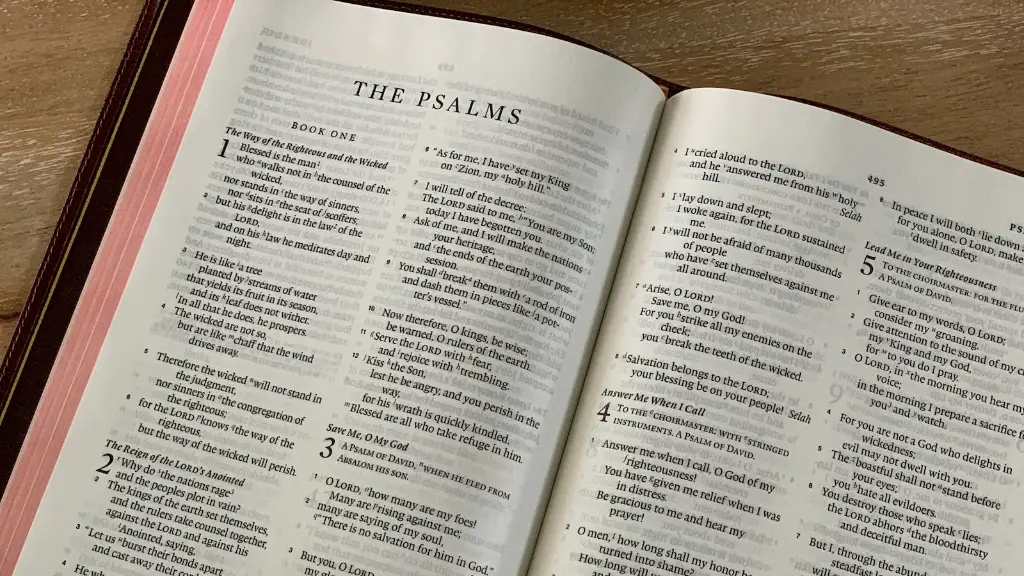The Bible mentions several covenants that serve as an agreement between God and His people. But what exactly is a covenant and how many of them are there in the Bible?
Covenants are an ancient form of agreement or treaty between two or more parties. They serve as promises or assurances, and often contain conditions which, if not kept, can lead to their termination. In the Bible, covenants feature predominantly, providing a foundation for the promises given and for a relationship between God and His people, Israel. As a result, the Bible speaks of six main covenants.
The Noahic Covenant is first mentioned in Genesis 9, and is between God and Noah. God promises to protect Noah and his descendants from any future floods and states that He will remember this covenant forever. This covenant is important because it serves as the basis for all future covenants between God and humanity.
The Abrahamic Covenant is recounted in Genesis 12-17 and is between God and Abraham. In it, God promises Abraham a great number of descendants, and that His protection will be upon them. This covenant is closely related to the land covenant, which promises the land of Canaan to Abraham and his descendants.
The Mosaic Covenant, also known as the Sinai Covenant, is recorded in the Book of Exodus. It is a unique kind of covenant in which both parties have to keep the terms of the agreement – God promises the Israelites His protection and guidance, and the Israelites agree to obey God’s commandments.
The Davidic Covenant is described in 2 Samuel 7. In it, God promises King David and his descendants a perpetual dynasty. This covenant is seen as a reflection of the Abrahamic Covenant.
The New Covenant
The New Covenant is mentioned in the Old and New Testaments. According to the prophecies of Jeremiah, Isaiah and Ezekiel, this covenant will replace the Mosaic Covenant and provide a new relationship between God and His people. The New Covenant promises the forgiveness of sins of those who believe, and God’s Spirit dwelling within His people.
The last covenant mentioned in the Bible is the Everlasting Covenant. This covenant is also known as the Covenant of Redemption and is promised to Abraham’s descendants. In it, God promises protection and blessings for His people, and a renewal of His Covenant with them for all eternity. This covenant is seen as the fulfilment of the promises contained in all the previous covenants.
Outward Signification of Covenant
In order to signify a covenant, an outward sign was often used. This could be an animal, an object or a symbol. For example, when God established the Abrahamic Covenant He used a symbol in the form of a burning firepot, which served as a reminder of His promise. Similarly, the rainbow was used to signify the Noahic Covenant.
In addition, God established covenants with individuals, such as Elijah and Abram and with others such as Gideon. These are called personal covenants. They are often seen as an extension of the bigger, broader covenants.
Important Features of the Covenants
The main feature of a covenant is the promise or assurance given, which is often accompanied by a condition that needs to be fulfilled for it to take effect. For example, in the covenant with Noah, God promised to protect from floods provided that Noah followed His commandments. This is typical of most covenants in the Bible, which give God’s people the freedom to choose whether or not they will fulfill their part of the agreement.
The covenants in the Bible give hope and assurance to the people of God, who are called to place their faith in Him. They serve as a reminder that God is merciful and faithful, and that His promises will never fail. For this reason, covenants are seen as sacred, and often serve as the basis for all relationships between God and His people.
God’s Involvement With His People Through Covenants
The covenants in the Bible demonstrate God’s involvement in the lives of His people. By promising protection and guidance, God shows His concern for their welfare. In addition, by establishing covenants, God shows His eagerness to keep His promises and to bless His people. This is most clearly seen in the covenant with Abraham, in which God promised to bless Abraham and his descendants with land, descendants, and an everlasting dynasty.
By establishing these covenants, as well as personal covenants, God has enabled His people to have a relationship with Him. Through this relationship, He is able to fulfill His promises, guide His people and bless them with protection, love and blessings.
Conclusion
In conclusion, covenants in the Bible play a very important role in the relationship between God and His people. They serve as a reminder that God is faithful and loving, and that His promises will never fail. There are six main covenants in the Bible, with additional personal covenants, and each of them has particular features and importance. Most importantly, they demonstrate God’s involvement in the lives of His people, providing them with assurance and hope.



